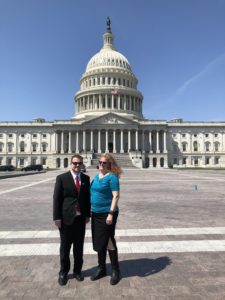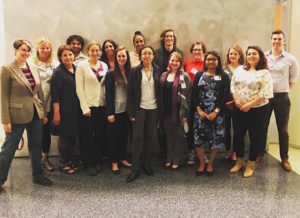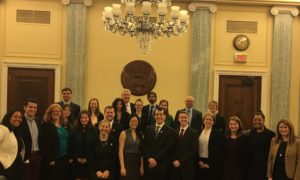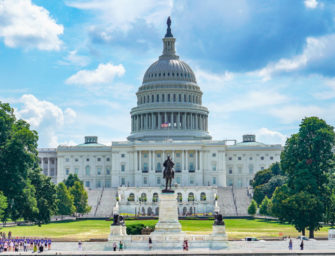Scientists Make the Best Science Advocates
By Denise Hills, President-elect AGU Earth and Space Science Informatics Section and Director, Energy Investigations, Geological Survey of Alabama
The best advocates for science are those of us actively engaged in it. No one is better suited for expressing the impact of what we do than we are. If we find common values, we can make connections with those who have differing opinions and find solutions. I suspect that many of us became scientists because we liked to find answers to questions – to problems – and being an advocate for science is just another way to answer questions.

Voices for Science policy track members Joshua Papacek and Denise Hills outside Capitol Hill
In May of 2017, I participated in one of AGU’s Congressional Visits Day (CVD). These CVDs are a time for scientists to engage with their elected representatives and to speak up on how important the scientific enterprise is to all our lives. I’ve always been one to try to get people excited about science – to have people understand that what I do is interesting and important, even if they themselves aren’t scientists. Participating in AGU’s CVD was a great way for me to build on my passion and take it to the next level. Our CVD class was so inspired that we’ve made a call to action for all AGU scientists, particularly around the AGU Fall Meeting and Centennial kick-off in December.

Members of the 2018 Voices for Science communications track with Sharing Science staff Olivia Ambrogio and Shane Hanlon
AGU’s Public Affairs department and Sharing Science program launched a new program this year called “Voices for Science.” As a part of AGU’s continuing commitment to increasing the widespread understanding of Earth and space science and highlighting its value, the Voices for Science program is all about training scientists to be better communicators about the value and impact of Earth and space science to key decision makers, journalists, and public audiences. There are two tracks available, with slightly different foci – one track focusing on media and public communications, and one track focusing on policy. The program is a year-long commitment with Advocates expected to engage with their identified audiences at least one time per month. I am thrilled that I was accepted as part of the inaugural cohort in the policy track.
Voices for Science Advocates met in Washington, D.C., 12-13 April 2018, for intense training for the upcoming year. The Sharing Science and Public Affairs staff of AGU led a rigorous day-long training for both the communications and policy tracks. Our second day, the tracks split, with the communications track doing a deep dive into different audiences and the policy track making visits to Congressional offices.
If you’ve never made a visit to a Congressional office, you might think that it is intimidating and maybe even impossible. Let me assure you, after doing a few, it’s not so intimidating and it’s very possible! One reason the visits we made were so successful is because of the great training that AGU staff provides – most resources are available through AGU’s Sharing Science or Science Policy websites.
Understanding how to approach these meetings is key to having successful encounters. We have information that they need to make informed decisions, if we can only share it in ways that are useful for them. Be upfront about why you’re there (e.g., a specific funding request; offering yourself as a resource for scientific expertise) and be respectful of their time. Understand that they may not want all the details of your project, but they are concerned about how it impacts their constituents and interests.

Members of the 2018 Voices for Science policy track with AGU Public Affairs staff
I greatly appreciate the opportunities that AGU has provided to me to grow not only as a scientist but as a member of our larger world community. I became a scientist to change the world, and I think being a Voices for Science Advocate will help me do that.
The coming year is going to be a busy one, as I continue to learn how to be a Voices for Science Advocate. It’s also going to be an exciting year, as I start to build lasting relationships with Congressional offices. I encourage you to follow the Voices for Science Advocates’ activities by keeping an eye on the social media hashtags #VoicesForScience and #ScienceIsEssential and by following @AGUSciPolicy and @AGU_SciComm on Twitter.
Editor’s Note: The Voices for Science program was launched in 2018 as a new outreach effort to increase AGU’s influence in key states. Learn more about the program, the communications and media track, and the participants in this Eos article.




Well, this is what congressmen do. The entire congressional delegation from the Denver area is probably all over Amazon to do HQ2 here. Makes sense.